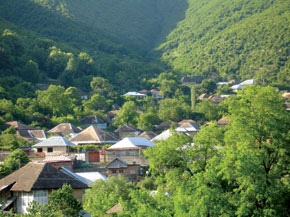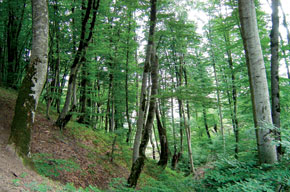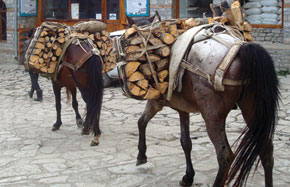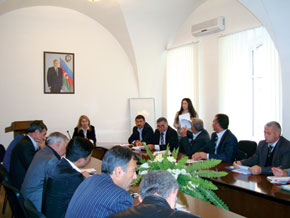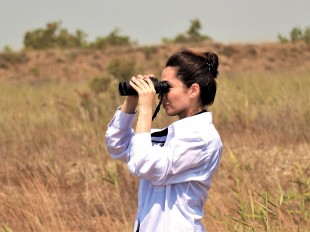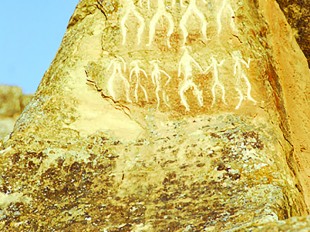Pages 60-64
by Fiona Maclachlan
Azerbaijan has wonderful forests! They are natural forests, mostly containing deciduous hardwood species; indeed some forests are so ancient that they originated before the ice age. The forest ecosystems are of strategic value, with more than 450 species of tree and shrub, and they support many endemic and rare species of plant and animal life. Forests of iron-wood (Parrotia persica), forests of chestnut-leaved oak (Quercus castaneifolia)… even the names of the trees sound magical!
At the time of the break-up of the Soviet Union, a time of severe economic crisis for Azerbaijan, people in the countryside turned to the forest for survival. It was a major source of fuel and income from felling.
Azerbaijan’s forests are state-owned. Using wood from them is illegal and, as a result, wood stolen from forests was not only fuelling home fires, it was also fuelling corruption as people in desperation did whatever was necessary to maintain some kind of way of life. Azerbaijan’s precious forests also fell victim to the needs of Internally Dis placed People as a result of the Nagorno- Karabakh conflict. Add to this the overgrazing by cattle and sheep carried out by farmers in the forests, which in extreme cases prevents forest regeneration, and Azerbaijan’s forests are facing an uncertain future. There is no doubt that Azerbaijan has a big problem with its forests.
Since the dissolution of the Soviet Union, the country’s Ministry of Ecology and Natural Resources has battled, indeed with partial success, to halt the decline in forest cover.
But now there is a new way forward, with international help and cooperation.
Help for the forests has been initiated by the European Union
The ENPI-FLEG ‘Improving Forest Law Enforcement and governance in the European Neighbourhood Policy East Countries and Russia’ Program was initiated due to the growing threat to forests not only in Azerbaijan but also in Armenia, Georgia, Moldova, Ukraine, Belarus and Russia. It was initiated by the European Union and implemented in Azerbaijan by the IUCN (International Union for Conservation of Nature), the World Bank and the WWF (World Wildlife fund).
Any of you who have read my articles before will know that I have something of a passion for Azerbaijan’s very special nature, and you will realize how delighted I was to read about this programme. I’ve even been able to meet up with Azerbaijan’s Azer Garayev, the Programme’s Coordinator in Azerbaijan, to find out exactly what’s going on.
First of all, I wanted to know how ‘international’ the project feels.
He explained that so far the staff involved with the project in Azerbaijan have all been locals, but they are recruiting international forest management consultants to help with the review of the current forest legislation.
Changing the current forest legislation
The consultants` task is to review the existing legislation and forest codes and figure out where changes have to be made. Proposals to make changes to the current legislation will then be made to the appropriate government authority. Applications are coming in from places like Turkey and Australia for these positions.
The official meetings are all in the English language, although Azer says that the project people often speak informally in Russian to each other.
People’s rights and people’s needs versus sustainable forest use
Azer explained that the project is very much concerned with local people’s rights, the absolute necessity for the rural population to take wood for fuel.
Only 10 per cent of village people have a gas supply and therefore 90 per cent need wood. This fact appears as a pressing problem of the Azerbaijani forest sector. The current legislation triggers corruption.
Our dilemma here is to protect the rights of both local population and businesses and to ensure the sustainable use of forest resources. I’m nodding in absolute agreement. I ask what the reaction has been from the relevant authorities. Azer explains that they (the government, appropriate institutions, NGOs and similar stakeholders) are pleased to cooperate.
The project gets going: involving Azerbaijan’s Forestry Science Research Institute
First off, the project team met with Azerbaijan’s Forestry Science Research Institute, an academic body which comes under the Ministry of Ecology and Natural Resources. Ideas to set up a forest police were discussed, and the project team was able to describe how poorly the current legislation is being understood, even by workers in the field. The team propose the idea of a ‘Model Forest’ for experiment, and were delighted that this idea gained complete endorsement from the scholars who have long been thinking along the same line. The Minister, Mr. Bagirov, voiced his valuable endorsement, requesting that for the best support and promotion of the development of the legal use of forest resources and effective forest governance, some environmentally responsible local businesses should first carry out forest rehabilitation work, in advance of any new logging activity.
Involving agrarian specialists and scholars from the University of Ganja
Next stop was the State Agrarian University of Ganja, where the new generation of agrarian specialists is studying. Broad and extensive discussions led to the University’s rector, Mr Sadigov, promising to provide full assistance and support from the university. They even planned ahead to meet again in 2011, with scholars, professors, employees in the forest sector, local authority representatives and people from the rural communities all to be invited.
A pilot study in Astara and Lenkoran regions
Azad Aliyev and Zitta Hasanova, ENPI FLEG consultants, got going straight away with a study in the forest area of the Astara-Lenkaran region of Azerbaijan. This forest region is particularly valuable and was recommended by the Ministry of Ecology and Natural Resources as a good place to start. Off they went to look at how the forests are being used. They spoke to local people and local governmental organisations, conducting interviews, carrying out opinion polls and surveys and so on. The results show that significant changes have occurred over recent years in agriculture, animal breeding and construction, in both the private and state sectors. Notably, electricity and water supplies are being improved and, perhaps most importantly, by 2013, the state programme of gasification will be complete. Until now the local population has, in absolute desperation, used the forest resources for heating purposes.
Seminars
The Society of Sociological and Juridical Studies (known as ZIYA) have been out to pilot regions to carry out training and to deliver seminars relating to the practice of illegal logging. Current legislation was explained and, overall, the training programme feedback re-emphasised the need for gas supplies to the villages.
Launching the first Education Packs
Education packs are now being developed by consultants on ecology and forest-oriented education. They invited the Forestry Research Institute of Azerbaijan and the Ministry of Education (which includes extracurricular education) to partici pate and this resulted in various recommendations for the development of forestry based initiatives in the countryside. Time and time again, the need to educate young people on ecology, right from the beginning of their time at school, has come up as an essential part of the process to encourage sustainable use of the forests.
Developing international links
As Programme Coordinator, Azer travelled to Trentino in Italy to the international Terra Madre event in October 2010. With sustainable forest usage high on the agenda, Azer learnt about bee keeping, forest sources of medicinal plants, mushrooms, wild fruits and berries. Meetings with ENPI FLEG staff in the other partici pating countries have resulted in discussions of methodology in information gathering as well as presenting the results of studies showing the reasons for unsustainable forest use. Similarly, the educational requirements and initiatives that are being developed have been discussed between the partici pating countries.
The project is especially interesting, Azer explains, because there is also such good cooperation between all the partici pating countries, whatever their political differences.
The project has been going in Azerbaijan for about six months so far, and the European Commission plans an end date of July 2012.
Working together for forest survival
In August 2010, just one month after the project kicked off, a heat wave in Azerbaijan resulted in a number of forest fires in at least 10 different regions of the country. As a result of the cooperative efforts of the Ministry of Emergency Situations, the Ministry of Ecology and Natural Resources and also local help, the fires were contained and the damage was minimised.
The most recent quarterly newsletter of the ENPI FLEG project (September – December 2010) begins with the quote:
“..the most patriotic thing you can do is to take care of the environment and try to live sustainably.” Robert F. Kennedy, Jr This quote was I believe particularly well chosen for Azerbaijan because people here are extremely patriotic.
The final declaration of Mexico’s Cancun Climate Change Conference 2010 recommended that a mechanism of sustainable forest practices has to be strongly supported and promoted.
2011 is the United Nations “International Year of Forests”. I do hope we are now witnessing an Azerbaijani fight for its forests, leading to their rehabilitation and survival.
by Fiona Maclachlan
Azerbaijan has wonderful forests! They are natural forests, mostly containing deciduous hardwood species; indeed some forests are so ancient that they originated before the ice age. The forest ecosystems are of strategic value, with more than 450 species of tree and shrub, and they support many endemic and rare species of plant and animal life. Forests of iron-wood (Parrotia persica), forests of chestnut-leaved oak (Quercus castaneifolia)… even the names of the trees sound magical!
At the time of the break-up of the Soviet Union, a time of severe economic crisis for Azerbaijan, people in the countryside turned to the forest for survival. It was a major source of fuel and income from felling.
Azerbaijan’s forests are state-owned. Using wood from them is illegal and, as a result, wood stolen from forests was not only fuelling home fires, it was also fuelling corruption as people in desperation did whatever was necessary to maintain some kind of way of life. Azerbaijan’s precious forests also fell victim to the needs of Internally Dis placed People as a result of the Nagorno- Karabakh conflict. Add to this the overgrazing by cattle and sheep carried out by farmers in the forests, which in extreme cases prevents forest regeneration, and Azerbaijan’s forests are facing an uncertain future. There is no doubt that Azerbaijan has a big problem with its forests.
Since the dissolution of the Soviet Union, the country’s Ministry of Ecology and Natural Resources has battled, indeed with partial success, to halt the decline in forest cover.
But now there is a new way forward, with international help and cooperation.
Help for the forests has been initiated by the European Union
The ENPI-FLEG ‘Improving Forest Law Enforcement and governance in the European Neighbourhood Policy East Countries and Russia’ Program was initiated due to the growing threat to forests not only in Azerbaijan but also in Armenia, Georgia, Moldova, Ukraine, Belarus and Russia. It was initiated by the European Union and implemented in Azerbaijan by the IUCN (International Union for Conservation of Nature), the World Bank and the WWF (World Wildlife fund).
Any of you who have read my articles before will know that I have something of a passion for Azerbaijan’s very special nature, and you will realize how delighted I was to read about this programme. I’ve even been able to meet up with Azerbaijan’s Azer Garayev, the Programme’s Coordinator in Azerbaijan, to find out exactly what’s going on.
First of all, I wanted to know how ‘international’ the project feels.
He explained that so far the staff involved with the project in Azerbaijan have all been locals, but they are recruiting international forest management consultants to help with the review of the current forest legislation.
Changing the current forest legislation
The consultants` task is to review the existing legislation and forest codes and figure out where changes have to be made. Proposals to make changes to the current legislation will then be made to the appropriate government authority. Applications are coming in from places like Turkey and Australia for these positions.
The official meetings are all in the English language, although Azer says that the project people often speak informally in Russian to each other.
People’s rights and people’s needs versus sustainable forest use
Azer explained that the project is very much concerned with local people’s rights, the absolute necessity for the rural population to take wood for fuel.
Only 10 per cent of village people have a gas supply and therefore 90 per cent need wood. This fact appears as a pressing problem of the Azerbaijani forest sector. The current legislation triggers corruption.
Our dilemma here is to protect the rights of both local population and businesses and to ensure the sustainable use of forest resources. I’m nodding in absolute agreement. I ask what the reaction has been from the relevant authorities. Azer explains that they (the government, appropriate institutions, NGOs and similar stakeholders) are pleased to cooperate.
The project gets going: involving Azerbaijan’s Forestry Science Research Institute
First off, the project team met with Azerbaijan’s Forestry Science Research Institute, an academic body which comes under the Ministry of Ecology and Natural Resources. Ideas to set up a forest police were discussed, and the project team was able to describe how poorly the current legislation is being understood, even by workers in the field. The team propose the idea of a ‘Model Forest’ for experiment, and were delighted that this idea gained complete endorsement from the scholars who have long been thinking along the same line. The Minister, Mr. Bagirov, voiced his valuable endorsement, requesting that for the best support and promotion of the development of the legal use of forest resources and effective forest governance, some environmentally responsible local businesses should first carry out forest rehabilitation work, in advance of any new logging activity.
Involving agrarian specialists and scholars from the University of Ganja
Next stop was the State Agrarian University of Ganja, where the new generation of agrarian specialists is studying. Broad and extensive discussions led to the University’s rector, Mr Sadigov, promising to provide full assistance and support from the university. They even planned ahead to meet again in 2011, with scholars, professors, employees in the forest sector, local authority representatives and people from the rural communities all to be invited.
A pilot study in Astara and Lenkoran regions
Azad Aliyev and Zitta Hasanova, ENPI FLEG consultants, got going straight away with a study in the forest area of the Astara-Lenkaran region of Azerbaijan. This forest region is particularly valuable and was recommended by the Ministry of Ecology and Natural Resources as a good place to start. Off they went to look at how the forests are being used. They spoke to local people and local governmental organisations, conducting interviews, carrying out opinion polls and surveys and so on. The results show that significant changes have occurred over recent years in agriculture, animal breeding and construction, in both the private and state sectors. Notably, electricity and water supplies are being improved and, perhaps most importantly, by 2013, the state programme of gasification will be complete. Until now the local population has, in absolute desperation, used the forest resources for heating purposes.
Seminars
The Society of Sociological and Juridical Studies (known as ZIYA) have been out to pilot regions to carry out training and to deliver seminars relating to the practice of illegal logging. Current legislation was explained and, overall, the training programme feedback re-emphasised the need for gas supplies to the villages.
Launching the first Education Packs
Education packs are now being developed by consultants on ecology and forest-oriented education. They invited the Forestry Research Institute of Azerbaijan and the Ministry of Education (which includes extracurricular education) to partici pate and this resulted in various recommendations for the development of forestry based initiatives in the countryside. Time and time again, the need to educate young people on ecology, right from the beginning of their time at school, has come up as an essential part of the process to encourage sustainable use of the forests.
Developing international links
As Programme Coordinator, Azer travelled to Trentino in Italy to the international Terra Madre event in October 2010. With sustainable forest usage high on the agenda, Azer learnt about bee keeping, forest sources of medicinal plants, mushrooms, wild fruits and berries. Meetings with ENPI FLEG staff in the other partici pating countries have resulted in discussions of methodology in information gathering as well as presenting the results of studies showing the reasons for unsustainable forest use. Similarly, the educational requirements and initiatives that are being developed have been discussed between the partici pating countries.
The project is especially interesting, Azer explains, because there is also such good cooperation between all the partici pating countries, whatever their political differences.
The project has been going in Azerbaijan for about six months so far, and the European Commission plans an end date of July 2012.
Working together for forest survival
In August 2010, just one month after the project kicked off, a heat wave in Azerbaijan resulted in a number of forest fires in at least 10 different regions of the country. As a result of the cooperative efforts of the Ministry of Emergency Situations, the Ministry of Ecology and Natural Resources and also local help, the fires were contained and the damage was minimised.
The most recent quarterly newsletter of the ENPI FLEG project (September – December 2010) begins with the quote:
“..the most patriotic thing you can do is to take care of the environment and try to live sustainably.” Robert F. Kennedy, Jr This quote was I believe particularly well chosen for Azerbaijan because people here are extremely patriotic.
The final declaration of Mexico’s Cancun Climate Change Conference 2010 recommended that a mechanism of sustainable forest practices has to be strongly supported and promoted.
2011 is the United Nations “International Year of Forests”. I do hope we are now witnessing an Azerbaijani fight for its forests, leading to their rehabilitation and survival.
